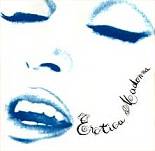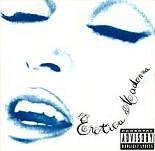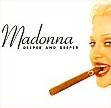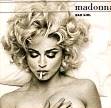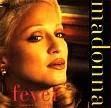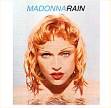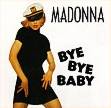 |
||||||||||||||||||||||||||||||
|
||||||||||||||||||||||||||||||
|
||||||||||||||||||||||||||||||
| << back | 1 2 3 4 5 6 7 8 9 10 11 12 13 14 | next >> |
Madonna released EROTICA around the same time she released her Sex book, and that's exactly what it sounds like. The title song has a sensuously static groove over which she commands, "put your hands all over my body." "Where Life Begins" demands that you do something a whole lot more intimate (and quite unrepeatable here) to her. The CD booklet has a photo of Madonna in bondage. To get across the album's naughty feel, Madonna dispensed with the pop prettiness of LIKE A PRAYER and returned to her hard-core dance club roots. She and co-producer Shep Pettibone, who had made his name as a club DJ and dance remixer, craft some alluring bad-girl grooves (catch the ocean-deep bass on "Waiting") while still managing to keep things catchy. "Deeper And Deeper " is celebratory dance-pop (with a brief Latin break that nods to the music's true roots) and "Rain" stands among Madonna's major ballads. There's a strange heaviness amidst the fun, games and bondage on EROTICA, which "In This Life" goes a long way toward explaining: It's about AIDS and homophobia. At her naughtiest and most R-rated, Madonna still carries a message, and it resonates well beyond the dance floor. Source: MTV.com It took Madonna ten years, but she finally made the record everyone has accused her of making all along. Chilly, deliberate, relentlessly posturing. Erotica is a post-AIDS album about romance – it doesn't so much evoke sex as provide a fetishistic abstraction of it. She may have intended to rattle America with hot talk about oral gratification and role switching, but sensuality is the last thing on the album's mind. Moving claustrophobically within the schematic confines of dominance and submission, Erotica plays out its fantasies with astringent aloofness, unhumid and uninviting. The production choices suggest not a celebration of the physical but a critique of commercial representations of sex – whether Paul Verhoeven's, Bruce Weber's or Madonna's – that by definition should not be mistaken for the real thing. It succeeds in a way the innocent post-punk diva of Madonna and the thoughtful songwriter of Like a Prayer could not have imagined. Its cold, remote sound systematically undoes every one of the singer's intimate promises. Clinical enough on its own terms when compared with the lushness and romanticism of Madonna's past grooves, Erotica is stunningly reined in; even when it achieves disco greatness, it's never heady. Madonna, along with coproducers Andre Betts and Shep Pettibone, tamps down every opportunity to let loose – moments ripe for a crescendo, a soaring instrumental break, a chance for the listener to dance along, are over the instant they are heard. Erotica is Madonna's show (the music leaves no room for audience participation), and her production teases and then denies with the grim control of a dominatrix. Against maraca beats and a shimmying horn riff, "Erotica" introduces Madonna as "Mistress Dita," whose husky invocations of "do as I say" promise a smorgasbord of sexual experimentation, like the one portrayed in the video for "Justify My Love." But the sensibility of "Erotica" is miles removed from the warm come-ons of "Justify," which got its heat from privacy and romance – the singer's exhortations to "tell me your dreams." The Madonna of "Erotica" is in no way interested in your dreams; she's after compliance, and not merely physical compliance either. The song demands the passivity of a listener, not a sexual partner. It's insistently self-absorbed – "Vogue" with a dirty mouth, where all the real action's on the dance floor. Look (or listen) but don't touch sexuality isn't the only peep-show aspect of this album; Erotica strives for anonymity the way True Blue strove for intimacy. With the exception of the riveting "Bad Girl," in which the singer teases out shades of ambiguity in the mind of a girl who'd rather mess herself up than end a relationship she's too neurotic to handle, the characters remain faceless. It's as if Madonna recognizes the discomfort we feel when sensing the human character of a woman whose function is purely sexual. A sex symbol herself, she coolly removes the threat of her own personality. Pure disco moments like the whirligig "Deeper and Deeper" don't need emotional resonance to make them race. But the record sustains its icy tone throughout the yearning ballads ("Rain," "Waiting") and confessional moods ("Secret Garden"). Relieved of Madonna's celebrity baggage, they're abstract nearly to the point of nonexistence – ideas of love songs posing as the real thing. Even when Madonna draws from her own life, she's all reaction, no feeling: The snippy "Thief of Hearts" takes swipes at a man stealer but not out of love or loyalty toward the purloined boyfriend, who isn't even mentioned. By depersonalizing herself to a mocking extreme, the Madonna of Erotica is sexy in only the most objectified terms, just as the album is only in the most literal sense what it claims to be. Like erotica, Erotica is a tool rather than an experience. Its stridency at once refutes and justifies what her detractors have always said: Every persona is a fake, the self-actualized amazon of "Express Yourself" no less than the breathless baby doll of "Material Girl." Erotica continually subverts this posing to expose its function as pop playacting. The narrator of "Bye Bye Baby" ostensibly dumps the creep who's been mistreating her, but Madonna's infantile vocal and flat delivery are anything but assertive – she could be a drag queen toying with a pop hit of the past. Erotica is everything Madonna has been denounced for being – meticulous, calculated, domineering and artificial. It accepts those charges and answers with a brilliant record to prove them. Source: Rolling Stone, Arion Berger, November 26, 1992 |
||
| << back | 1 2 3 4 5 6 7 8 9 10 11 12 13 14 | next >> |

|
||||||||||||||||||||||||||||||||||||||||||||||||||||||||||||||||||||||||||||||||||||||||||||||||
|
||||||||||||||||||||||||||||||||||||||||||||||||||||||||||||||||||||||||||||||||||||||||||||||||
